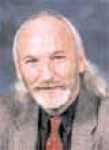The tongue is mightier than the sword

The title of today's column is a bastardization of the classic phrase, "the pen is mightier than the sword" and one that is, I believe, more accurate than the original saying. Certainly the pen carries great influence.
Knowledge is power and the ability to express oneself in a meaningful way with the written word carries with it both obligation and responsibility.
The difference between the pen and the tongue, however, is significant and profound.
Once one commits something to paper, it is there for all to see. The naysayers of the world will read it with a fine tooth comb, literally breaking down the words one by one, attempting to find a fallacy in the facts presented or the positions taken. Once written and authored, we don't have the luxury of asserting that we didn't say that, because the words are there for all to see. Authorship and ownership of those words and phrases are there for anyone's examination and we can't blame our words on anyone else.
The tongue is quite different, however. The tongue can wag from daylight till dark and can always be denied the next day. If we are ever personally challenged on things we have said, we can simply say that the person must have misunderstood either what we said or what we meant. Or we can say we didn't say it at all. We can always deny ownership of our words because they disappear into the void once spoken and all proof disappears with them.
That's why we're so good at criticizing and evaluating the lives of others.
No proof exists after we've spoken hurtful or hateful or deceitful words that we ever said those things. Even those people we said them too often question their own recollections when challenged and often end up confessing that maybe they just misunderstood what we said. So, in those rare instances where someone does challenge something we say, we simply deny, deny, deny.
I don't know how many of us ever stop to think about the hurt and damage we cause others when we pass along damaging or untruthful allegations and/or observations about others. The reason why our tongues wag is pretty obvious.
Many of us choose to build ourselves up by climbing on top of the dead carcasses we've left behind through our character assassinations. We make ourselves look better, we think, by making others look worse.
One of the basic assumptions people have historically made about others is that people speak the truth. Consequently, until we know someone has misled us, we tend to believe what they tell us. We don't go out and check facts and validate stories like newspaper reporters and police officers do, because we assume we've been told the truth. And then we spread the story to others as truth because we believe it to be so.
The obvious thing to do when we hear something negative about another person is to check with the person in question to get their side of the story before we tell anyone else. But most of us don't do that.
Of course, the smaller the community is, the more likely tongues are going to wag because everybody knows each other. I was recently accused of writing fiction about the love of my life when the person who said it knew better.
Other people have their characters assassinated for anything and everything, if the person doing the tongue wagging thinks it gives them a leg up. We all know people who are know-it-alls about every single subject under the sun.
They have inside information and personal knowledge about EVERYTHING that's going on with EVERYONE and they somehow think this makes them important, when, in fact, it makes them look foolish.
It shouldn't be surprising that the most read items in the newspaper, after the obituaries, are the police reports and the bankruptcy filings. Too many of us focus on the negative instead of the positive. Too many of us experience feelings of power and exhilaration when we find out dirt about other people. Too many of us spend far too much time in other people's lives and not nearly enough in our own Tongue wagging is hurtful and harmful. It produces no positive benefits. It is anti-social. It is dangerous and degrading and, sometimes, deadly. It brings out the worst in us instead of the best. And, as amazing as it is, those who participate in name-calling and rumormongering do so in a way that the obviously believe makes them important and knowledgeable, when, in fact, it makes them look petty and small.
"Accentuate the positive" is the title of a great old song. The world would be a heck of a lot better place to live in if more of us practiced it.
